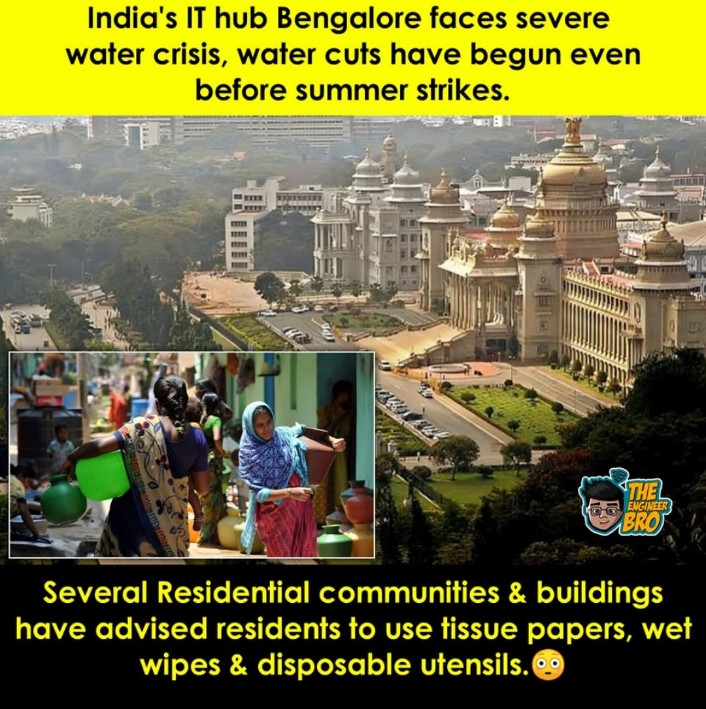Bengaluru , known as India’s Silicon Valley, is facing an unprecedented challenge as it grapples with one of the worst water crises in recent years. The situation has reached such a critical point that educational institutions, including schools and coaching centers, have resorted to conducting classes online to cope with the emergency. The crisis stems from a combination of factors, primarily poor rainfall in 2023, exacerbated by the El Nino effect, resulting in drying borewells and depleted water sources across the city.
The severity of the water shortage in Bengaluru is evident from the daily struggles faced by its residents. Families, like that of Sharaschandra from Uttarahalli, are compelled to rely on water tankers for their daily needs, with each tanker costing a significant amount. The burden of these expenses raises questions about the sustainability of such arrangements and the financial strain imposed on households already grappling with the repercussions of the crisis.
Government officials, including Karnataka’s Deputy Chief Minister D K Shivakumar, have acknowledged the gravity of the situation and initiated measures to address the water scarcity. The decision to take over private tankers and borewells, along with the utilization of milk tankers for water supply, reflects the urgency of the response required to mitigate the crisis. Furthermore, discussions on fixing water tanker rates indicate a concerted effort to regulate and manage the distribution of this vital resource.
The impact of the water crisis extends beyond residential areas, affecting essential services and infrastructure in the city. The Bangalore Water Supply and Sewerage Board (BWSSB) and the Bruhat Bengaluru Mahanagara Palike (BBMP) are under immense pressure to ensure water availability to the population. However, challenges persist as traditional water sources, such as the Krishnaraja Sagar Dam, struggle to meet the rising demand amid dwindling reserves.
The severity of the situation is underscored by the declaration of drought-hit taluks and the setting up of taluk-level control rooms and helplines to address water-related concerns. Task forces led by local representatives are tasked with overseeing water distribution and ensuring the availability of fodder for livestock, highlighting the multifaceted approach adopted to tackle the crisis at the grassroots level.
The onset of summer exacerbates the challenges posed by the water crisis, as demonstrated by the uncharacteristically high temperatures recorded in Bengaluru. The early arrival of summer, coupled with the looming specter of escalating temperatures, further strains existing resources and underscores the urgency of implementing sustainable solutions to safeguard the city’s water supply.
In response to the crisis, residential communities and buildings have resorted to innovative measures, such as encouraging the use of tissue papers, wet wipes, and disposable utensils to conserve water. However, these efforts, while commendable, are stopgap measures that underscore the need for comprehensive, long-term solutions to address Bengaluru’s water woes.
Bengaluru grapples with the repercussions of the water crisis, it serves as a sobering reminder of the urgent need for proactive measures to mitigate the impact of climate change and safeguard vital resources. The convergence of natural phenomena like the El Nino effect with human-induced factors underscores the complex nature of the challenges faced by urban centers in the 21st century. It is imperative for stakeholders, including government authorities, community leaders, and residents, to collaborate effectively and implement sustainable strategies to ensure the resilience and well-being of Bengaluru’s residents in the face of future crises.
As Bengaluru faces this tough situation, its people are sticking together and helping each other out. Communities are sharing what they have and working together to deal with the water shortage. People are starting projects to collect rainwater and refill the groundwater to make sure we have enough water for the future. Also, there are campaigns to teach everyone how to use water wisely and save it. By working together and taking care of our water, Bengaluru is trying to make sure everyone has enough for a long time.

